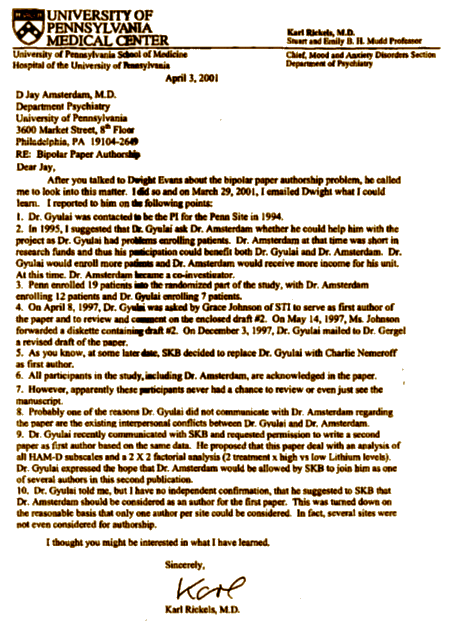Double-blind, placebo-controlled comparison of imipramine and paroxetine in the treatment of bipolar depression
by Nemeroff CB, Evans DL, Gyulai L, Sachs GS, Bowden CL, Gergel IP, Oakes R, and Pitts CD.
American Journal of Psychiatry. 2001 158(6):906-12.
Abstract
OBJECTIVE: This study compared the efficacy and safety of paroxetine and imipramine with that of placebo in the treatment of bipolar depression in adult outpatients stabilized on a regimen of lithium.
METHOD: In a double-blind, placebo-controlled study, 117 outpatients with DSM-III-R bipolar disorder, depressive phase, were randomly assigned to treatment with paroxetine (N=35), imipramine (N=39), or placebo (N=43) for 10 weeks. In addition to lithium monotherapy, patients may have received either carbamazepine or valproate in combination with lithium for control of manic symptoms. Patients were stratified on the basis of trough serum lithium levels determined at the screening visit (high: >0.8 meq/liter; low: <=0.8 meq/liter). Primary efficacy was assessed by change from baseline in scores on the Hamilton Rating Scale for Depression and the Clinical Global Impression illness severity scale.
RESULTS: Differences in overall efficacy among the three groups were not statistically significant. For patients with high serum lithium levels, antidepressant response at endpoint also did not significantly differ from placebo. However, both paroxetine and imipramine were superior to placebo for patients with low serum lithium levels. Compared to imipramine, paroxetine resulted in a lower incidence of adverse events, most notably emergence of manic symptoms.
CONCLUSIONS: Antidepressants may not be useful adjunctive therapy for bipolar depressed patients with high serum lithium levels. However, antidepressant therapy may be beneficial for patients who cannot tolerate high serum lithium levels or who have symptoms that are refractory to the antidepressant effects of lithium.

So take a look at the POGO article and the attached documents, feel the outrage, and fire off a letter to anyplace you think might listen [mine went to the American Journal of Psychiatry]. Just because it’s a dumb article, by a known offender [Charlie Nemeroff], ghost-written by an exposed ghost [Sally Laden], at an exposed ghost-writing firm [STI], hired by a sleazy pharmaceutical company [GSK AKA SKB], in a time of great sickness [2001], doesn’t mean it should be ignored.
This is a typical instance of Nemeroff-coordinated sleaze. An especially sleazy misrepresentation is the appearance in the byline that the study came “From the Department of Psychiatry and Behavioral Sciences, Emory University School of Medicine.†The only contributor at Emory listed among the investigators is Nemeroff himself. Um, how many patients did lead author Nemeroff contribute? Um, who actually managed the patients (if there were any) at Emory while Nemeroff was traveling the country giving ‘CME-like’ lectures for Glaxo and other corporations? Glaxo and STI were utterly cynical in promoting Nemeroff to lead author.
We should also underline the fact that NIMH funding supported this sleaze. This incident was not just a matter of KOLs making out with Glaxo. This involved precious public research funds that would have better been deployed in funding quality clinical science. So now NIMH is tainted once again with sleazy ethics, thanks to Nemeroff. When will they ever learn?
There’s another point to make about this article. Who is it that actually cares much about the effect of Paxil vs Imiprimine in “adult outpatients stabilized on a regimen of lithium” who “In addition to lithium monotherapy … may have received either carbamazepine or valproate in combination with lithium for control of manic symptoms?” My point? It’s an “infomercial” or “experimercial” or whatever you want to call a study that would never be done for drugs out of patent.
Differences in overall efficacy among the three groups were not statistically significant. For patients with high serum lithium levels, antidepressant response at endpoint also did not significantly differ from placebo. However, both paroxetine and imipramine were superior to placebo for patients with low serum lithium levels. Compared to imipramine, paroxetine resulted in a lower incidence of adverse events, most notably emergence of manic symptoms.
They really had to work at finding something good to say about Paxil in this particularly unremarkable study…
What Glaxo does with its R&D, er marketing, funds is Glaxo’s business. But we should not be happy that NIMH wasted our money on this stupid experimercial.
The sly representation of an edge for Glaxo’s drug Paxil (paroxetine) versus imipramine is a Nemeroff trademark. No wonder the corporations loved him – until he became too toxic for them to associate with him. Here is a similar instance where Nemeroff pulled much the same stunt for the Janssen drug Risperdal (risperidone) as an add-on treatment of depression. In that case, an out and out false claim was made, and nobody accepted responsibility for it. By some process of Immaculate Conception a P value of 0.4 was transformed into a P value of 0.05 both in the text and in the Abstract. There is no innocent explanation for this kind of thing. It is either fraud or negligence. Here is the link.
http://hcrenewal.blogspot.com/2008/01/antipsychotic-drugs-for-depression.html
When is Nemeroff going to start giving “CME-like” talks to the Cali Drug Cartel in South America? Its only a matter of time. He is, after all, now based in Miami. I think I am going to unwind and watch “Scarface” tonight to soothe my outrage.
Apparently the Nemeroff saga will never end. His name seems to pop up in about half of the scandal exposed.
Charlie is a paradigm. Not the kind he envisioned. More like the kind that gets presented at a case conference…
I like to say he has a long tail – in the liability sense. Those who got on board with his schemes and those who pandered to him are still paying the price years later.
And now, this: http://thedp.com/article/professors-accused-ghostwriting